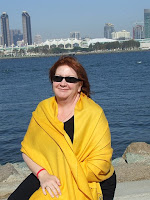You and your family have decided to enjoy a beautiful, sunny day at the local beach. You pack your picnic basket and enjoy the drive. You have laughed watching your children dig a rather large hole in the wet sand. You think to yourself, this was a great idea…it’s so good to get out, enjoy the sun and watch their joyful play!! After much pleading, coaxing and cajoling, you agree to be buried in their sandy pit. Before long, one child has been working at your feet. They are now covered with wet sand and you can’t get away. In the meantime, another child has been dumping buckets of wet sand onto your left arm, and pretty soon, you can wave to your spouse with your right arm and shout out that you are having fun. The children see progress and several other children join in so they can quicken their pace! Pretty soon, your left arm is buried and they are making good progress covering your legs, hips, waist, chest and finally your shoulders. Now…only your head is visible.
 At some point, you have convinced your children – via pleading or threats of death before their next birthday – to dig you out. It takes a bit, but you are free and the only sign of your ordeal, is that you are covered with sand, which is quickly washed away by a quick dip in the water. You are once again fully functional and independent. For an ALS patient, there is no gleeful option to “dig them out”.
At some point, you have convinced your children – via pleading or threats of death before their next birthday – to dig you out. It takes a bit, but you are free and the only sign of your ordeal, is that you are covered with sand, which is quickly washed away by a quick dip in the water. You are once again fully functional and independent. For an ALS patient, there is no gleeful option to “dig them out”.Tomorrow, as you (without assistance) get out of bed, stretch, eat your cereal, take your shower, get dressed, walk to your car, enjoy your Starbucks®, curse your allergies and blow your nose, go about your busy workday, navigate the traffic home, take the dog for a quick walk, enjoy a glass of wine with a juicy steak, hold your children as you read their bedtime story, bend over and pull up the covers to tuck them in, brush/floss your teeth, use the toilet, take your medications, put on your pajamas, climb into bed, read for 10 or 15 minutes, kiss your spouse, reach up and turn out the lights…please think back to the beach scene and consider that EVERY 90 minutes, of every day, ALS claims 2. Someone will get an ALS diagnosis and start the descent into the sand pit of complete dependence on a family of caregivers. And one will die from complications of ALS, usually because they can no longer breathe.
Now…again with the beach scene firmly in your mind and, because you can, I ask that you take the following three steps. Make a difference for the hundreds of families living with ALS who are served by the ALS Association in your community.
- Put on your tennies or ride your bike for a wheelchair bound patient in one of the Walks/Rides to Defeat ALS to be held around the US this fall. Please click http://web.alsa.org/site/PageServer?pagename=WLK_BP_stateselect to find the most convenient ride/walk and sign up today. While the economy struggles to get back onto its feet, consider that most ALS patients are trying to do the same and need your help – today more than ever. There are a number of examples below which will help you understand the safety, dignity and independence your generosity provides. I recommend a monthly donation of $5, $10, $25, $50, $100 or more (whatever your budget allows).
- In addition to your personal donation, make a commitment to raise $250. In the advanced stages, care for an ALS patient can reach $250,000 annually. In the early stages of the disease, your donation can buy independence, safety and respite for a patient or their family members.
- Pass this message along to everyone in your address book. Share it with friends, family, neighbors, co-workers, schoolmates, teachers, and local business owners….everyone within your sphere of influence and ask them to join you on the walk and to make the fundraising commitment.


.jpeg)


.jpeg)

.jpg)